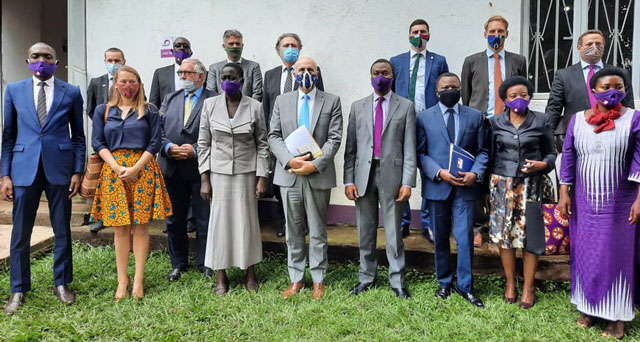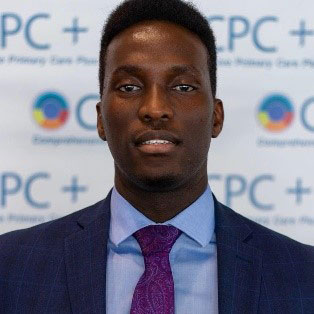COMMENT | Dr Bruce Tumwine Rwabasonga | Ugandan election — Highly publicized media images of the European Union delegates visiting opposition leaders in Uganda have been shared widely across social media over the last couple of weeks. While these would not have raised a lot of eyebrows at any other time, these images have garnered the public’s attention as they come a few months ahead of upcoming national elections.

In addition, unlike most diplomatic talks which either are tightly muted or covered transparently with media releases and press conferences, these have been different as despite being conducted in the public eye, the purpose and content discussed has been kept private thus far.
These meetings have also come at a time when awareness on two contextually related issues, Black Lives Matter movement and foreign interference in national elections have been elevated into the world’s consciousness. These two issues as well as the public display but private nature of these visits, pose a question – is the European Union delegation exerting undue influence on the upcoming national elections in Uganda or are these innocuous talks that the public shouldn’t read a lot into?
Role of foreign players in elections
The Special Counsel Investigation commonly known as the Mueller probe in 2019 exposed how significant the threat of a foreign player can be in any election.
As revealed in the Mueller probe report and congressional hearings, foreign interference in the 2016 US election was suspected to have been done with nefarious methods that ranged from hacking the computer servers of the Democratic National Committee to leaking of incriminating emails from the Clinton campaign. Other techniques that were done with varying levels of success included attempts to penetrate the election systems and databases of several US states as well as the much more documented social media misinformation campaigns that included Facebook ads and ‘troll farms’ propagating ‘false news’ stories.
This threat posed by foreign entities in an election, should be an area of concern as Uganda doesn’t have the resources that the US has, and that ended up being insufficient to withstand the foreign interference in its election.
Another related contextual issue is the Black Lives Matter movement.
As the world grappled with the unjust killing of Freddie Gray, the Black Lives Movement took front and center and forced people across the world particularly in white majority societies to analyze the systemic and structural factors that for generations have led to subjugation and oppression of black people in those nations.
One thing that became obvious as the conversation continued, was that this same subjugation and oppression of black people did exist within black majority nations too. In a 6/23/20 Financial Times article, Patrick Gathara writes the following paragraph that captures the essence of this discussion. “Less has been said about the racism inherent in the existing international order and the obstacles faced by black-majority nations. In principle, all nations have equal sovereignty; in practice, they have anything but. A racial hierarchy is clearly evident, with white nations at the top of the ladder, those of black Africa at the bottom….”.
All this said, the European Union remains the largest donor to Africa and by extension has bought itself a seat at Africa’s decision-making table.
With this ‘seat at the table’ comes responsibility to both African leaders and the European Union delegates alike to adhere to the ‘partnership’ guiding principles that are spelled out in the ‘post-Cotonou framework’ and the Joint Africa-EU Strategy.
For now, all Africans ought to be cautious and wary of the impact of this ‘partnership’ on the future of the continent. This concern is best described by Wandia Njoya, a Kenyan academic, who says the following on the status of the current ‘partnership’. “They basically say ‘I am superior to you and for you to be like me you have to do what I say and then I approve whether you are like me or not’.”
Echoes from the past
She goes on to say that in this way, the western world ‘partnership’ with Africa should be viewed as ‘rebranding of the civilizing mission of colonialism’. It is hard to argue against her assessment given the evidence seen in such visits in Uganda recently and other similar historical interactions.
As one looked at the images from the visit, one couldn’t help but wonder how much the precolonial visits by the then would be colonialists to tribal kings like King Kabalega and King Mwanga resembled these visits.
In the images, one can see a fleet of luxury SUVs, a number of pristinely dressed white people disembarking from cars with briefcases that one can assume carry important documents. From the serious looks on their faces and the officious air they carry, it is obvious that the importance of these talks haven’t been lost upon them.
One can’t help but wonder, is this the same pomp that the precolonial delegation arrived with to meet tribal kings? What was discussed and what promises were made in these talks? Will these talks have generational ramifications that Ugandans didn’t sign up for – as the historical ones did?
To all these questions, only opposition leaders and the EU delegation alone know the answers and without full transparency and disclosure of what was discussed, Ugandans will never know for sure what these discussions about the nation’s future entailed.

Dr. Rwabasonga is a Ugandan based in Washington, DC. He is a physician, public health professional and healthcare services consultant .
Email: Mande166@u